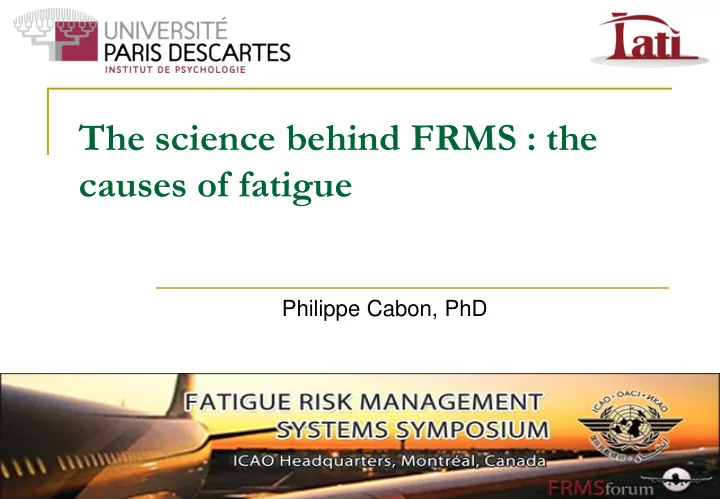

The science behind FRMS : the causes of fatigue Philippe Cabon, PhD Evaluation AERES Projet de recherche 1 du LATI
From intuition to science Fatigue is not only a scientific concept, it is used in the daily life and it is a subjective experience Everybody has the feeling of being a “fatigue expert” based on her/his own experience Fatigue is linked to physiological mechanisms but the way we perceive it is linked to psychological, social and cultural factors The way we perceive fatigue influences the way we behave FRMS Symosium, ICAO, Montreal 2
“Fatigue is a biological drive for a recuperative rest” Fatigue Time Rest of Day Sleepiness Sleep Time awake Task related factors Impaired Accident Adapted from Williamson Performance et al, 2011 Capabilities
Alertness components 60 Process S (homeostasic need 54 48 for sleep) 42 Alertness 36 30 24 18 12 Process W (sleep inertia) 6 0 0 2 4 6 8 10 12 14 16 18 Time since sleep (h) Alertness Process C (endogeneous circadian pacemaker) 0 2 4 6 8 10 12 14 16 18 20 22 24 Time of day (h)
Sleep gates and forbidden sleep zone High Primary gate Drowsiness Forbidden sleep zone Secondary gate Low 0800 1600 2400 0800 Hours Schematic representation of time periods favoring sleep onset (taken from Stampi, 1989)
Main fatigue factors in aviation Operational factors Internal factors Irregular hours of work Circadian factors Long duty times Homeostasic sleep Time Zone transitions Sleep inertia Task related factors Workload Monotony
Main effects of sleep loss Microsleeps Increased reaction time Unstable cognitive state (more variability of performance) Divergent thinking is more impacted than convergent thinking => creative, innovative decision are more impacted than procedural decision 7 FRMS Symposium, ICAO, Montreal
Microsleeps FRMS Symposium, ICAO, Montreal
Microsleeps can occur even during critical phase of a flight 18 Outward flights 16 Return flights 14 Number of microsleeps 12 10 8 6 4 2 0 90-60 60-30 30-0 Time before landing (mn) Microsleeps in the last 90 mn of the flights P.Cabon
Chronic sleep deprivation is incidious …. Van Dongen et al, 2003
Objective and subjective sleepiness during night driving 14 100 Alert Subjective evaluation 12 Ratio (%) 80 (U.A.) 10 60 Increased 8 risk of 6 accident 40 4 20 Objective sleepiness . 2 Subjective sleepiness Sleepy 0 0 D P1 P2 P3 F
The complexity of fatigue Fatigue is a normal physiological state ! Fatigue is not only caused by the time on task but by a complex interactions of various factors Fatigue and the way we perceive it are influenced by a large inter-individual variability (sleep needs, chronotype,..) and by social factors More researches are needed to understand the complexity of the link between fatigue and safety 12 FRMS Symposium, ICAO, Montreal
From science to regulation Science can improve the design of rules and rosters But the complexity of fatigue makes the design of “perfect” rules or rosters impossible Hours of work regulations focused on limited aspects of fatigue and cannot address its complexity while coping with operational/economics requirements FRMS is a promising way to better integrate the complexity of fatigue mechanisms in work schedules management 13 FRMS Symposium, ICAO, Montreal
Recommend
More recommend